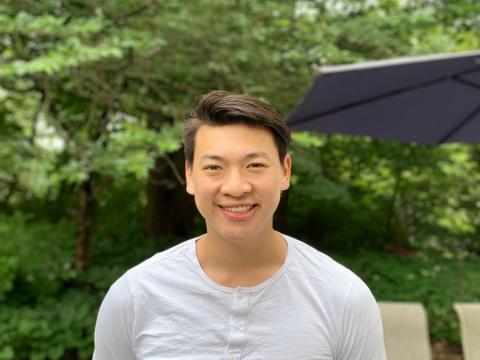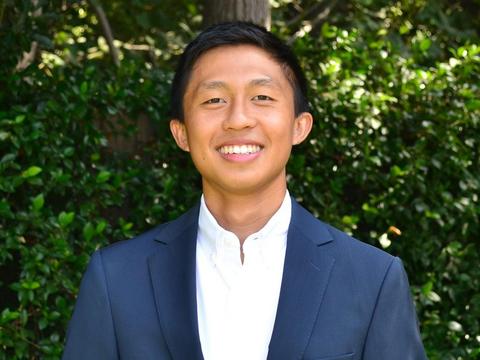Physics Major and Minor
Haverford’s Physics major and minor bring together students and faculty interested in investigating the physical principles that animate the natural world. Our rigorous programs provide significant opportunities for first-hand experimental and theoretical investigations and a solid foundation in the basic principles of the discipline.
Our program is especially flexible, allowing majors to pursue a range of allied interests—among them, astrophysics, biophysics, chemical physics, computing and engineering.
Curriculum & Courses
Our physics major is structured flexibly to allow students to either combine it with other interests and academic programs, or to take additional courses in physics, astrophysics, mathematics and related fields to prepare for graduate study.
Students pursue a curriculum that includes coursework in mechanics, thermodynamics, electricity, magnetism, and special relativity. Required classes also cover waves and optics, introductory quantum mechanics, and lab work in electronics and wave physics. Majors must take Calculus III and and additional math course in addition to other upper-level courses in core areas of physics. Our Senior Seminar and the associated senior talk and thesis are also required.
Minors pursue a curriculum that includes coursework in mechanics, thermodynamics, electricity, magnetism, and special relativity. Required classes also cover waves and optics, introductory quantum mechanics, and lab work in electronics and wave physics. They must also enroll in at least one of our 300-level core theoretical courses.
Extraordinary teachers and mentors, our faculty also work at the cutting edge of a wide range of areas—including astroparticle and early Universe physics, soft condensed matter and granular physics, extragalactic astronomy, biophysics, and nanoscience—creating exceptional research opportunities for majors. Those opportunities, as well as others beyond campus, are enhanced by our robust funding and placement system.
-
Major Requirements
Physics offers a major and a minor. Students who wish to apply credits from outside the Quaker Consortium toward the major or minor requirements must consult with the department chair before taking such courses.
Physics Major Requirements
- PHYS H105 (or PHYS H101), and PHYS H106 (or PHYS H102).
- PHYS H213 and PHYS H214 (our sophomore lecture course sequence) and PHYS H211 (sophomore-level laboratory course).
- MATH H121 (or MATH H216) and MATH H215 (or one of: MATH H222, MATH B203 [the Bryn Mawr equivalent of MATH H215], or another 200-level mathematics course with permission).
- Three 300-level physics lecture courses, two of which must be drawn from these core courses: PHYS H302, PHYS H303, PHYS H308, and PHYS H309 (or their Bryn Mawr equivalents).
- An upper-level laboratory course in the natural or applied sciences, such as PHYS H301, PHYS H326, ASTR H341, BIOL H300 or BIOL H301, or CHEM H301 or CHEM H302. (Alternately, the student can request the substitution of an advanced laboratory course in another area of science or applied science.)
- Senior Seminar (PHYS H399F and PHYS H399I) and the associated senior talk and thesis.
For students considering graduate study in physics, it’s helpful to take all of the core theory courses: PHYS H302, H303, H308, and H309 (or their Bryn Mawr equivalents; note that the Bryn Mawr version of 308 has much less emphasis on fluids). For students interested in graduate study in experimental physics, it is helpful to also take H326. For students interested in graduate study in theoretical/computational, it is helpful to also take a course relating to scientific computing, such as PHYS H304 or MATH H222. Any student interested in graduate study in any field should consult with their advisor for the courses that make the most sense for their particular case.
Senior Project
The senior research program demonstrates achievement in depth in a particular subfield of physics or astrophysics. Students participate in PHYS H399, a year-long, ½ credit per semester senior seminar. We assess students by their performance on a short talk during the fall semester, a comprehensive talk or poster presentation in the spring semester and a senior thesis written in the form of a scientific paper.
In addition, as part of the year-long senior seminar, senior physics majors study topics in scientific integrity in two student-led meetings, using readings and role-playing scenarios to learn best practices in the ethical conduct of research. They also receive training in life after Haverford, including how to choose and apply to graduate schools, and what careers are available outside science for physics majors.
Students are expected to place their senior research work in the context of the scientific literature in their field of study, and to present their results to an audience of professionals (for their thesis) and their peers (for the talk or poster). They are given training in searching and reading the scientific literature by each research supervisor, as well as specific materials through the senior seminar course.
Most students also take a senior research course for credit (though this is not required). Their work in this course also assesses their research accomplishments.
Senior Project Learning Goals
We expect senior research in physics to demonstrate:
- a clear understanding of the scientific context of the research (including a review of the relevant scientific literature).
- mastery of the content and findings of the research.
- independent problem solving and ability to synthesize material.
- an understanding of the forward looking implications of the research findings.
- clarity in the public presentation of the research.
Senior Project Assessment
The evaluation of students’ overall work in the senior seminar includes both their content knowledge in their research area, and their ability to communicate this work. In the fall semester, students write up the introduction and background sections of their senior thesis while getting training in researching and reading the scientific literature and properly referencing their bibliographic sources. They receive formative assessment from their senior thesis advisor on the fall paper, including suggestions for improvements on the final thesis. For the senior thesis, there are multiple rounds of assessment, since students get ongoing feedback from their research supervisors while writing their thesis, and they submit two distinct formal drafts which are read carefully by two faculty members who give extensive feedback. After each round, students must respond to this feedback while preparing their final thesis.
Similarly, each student gives a first short (10 minute) research talk in the fall and is given department-wide comments about how to improve this talk before they prepare and give their final senior presentation. Typically, each student practices each presentation several times, receiving detailed feedback from a supervisor in between to ensure they present their work at a level comparable with that of poster presentations and short talks at the American Physical Society or other comparable annual meetings.
The thesis research itself is evaluated for
- a demonstrated understanding of the context and content of the research (including a review of the relevant scientific literature),
- independent problem solving and synthesis, and
- success in understanding the forward looking implications of the research.
The written and oral presentations of the research are evaluated for
- a clear and appropriate writing style and
- well-curated visual displays of the research.
A further confirmation of quality is the number of senior research projects that lead to publication in a peer-reviewed scientific journal.
Requirements for Honors
The departmental awards for honors in physics are based on the quality of performance in course work and the senior colloquium and paper. High honors carries the additional requirement of demonstrated originality in senior research.
-
Minor Requirements
- PHYS H105 (or PHYS H101 or PHYS H115) and PHYS H106 (or PHYS H102); PHYS H213, PHYS H214, and PHYS H211 lab (or Bryn Mawr equivalents).
- MATH H121 (or MATH H216) and MATH H215 (or one of: MATH H222, MATH B203 [the Bryn Mawr equivalent of MATH H215], or another 200-level mathematics course with permission).
- One of the four “core” 300-level lecture courses in physics at Haverford or Bryn Mawr: PHYS H302, PHYS H303, PHYS H308, or PHYS H309.
Associated Programs and Concentrations
Research & Outreach
Student research culminates with our required two-semester Senior Seminar. In it, majors develop, draft, and present a scientific paper, based on original research performed with a faculty member or on existing research on a particular topic. Students also explore ethics and other conventions of the discipline, learn about career options and graduate programs, and interact with an array of visiting scientists as well as our vibrant alumni/ae community in this discussion-driven class.

The physics major and environmental studies minor used her thesis research to explore the sustainability efforts by Haverford College to design a microgrid.

The physics major created a framework for building a robotic spotted lanternfly simulation.

The physics major developed a method of autonomous spacecraft navigation, by which satellites can pinpoint their own location.

The physics major used Oort constants to study the Milky Way for her thesis.

The physics major analyzed the movement of locust swarms in his thesis.

The physics major and economics minor used his thesis to study the properties of millisecond pulsars and their emission of Giant Pulses.
After Graduation
We are invested in the long-term success of our students and are committed to developing the skills and perspectives—as well as the relationships—that will enable our majors to thrive as grad students at top programs and in a range of careers.
Nearly half of our majors pursue graduate study at the Ph.D. level in physics or astrophysics. Others go on to graduate programs in areas such as mathematics, engineering, materials science, climate science, and computer science, while still others pursue careers in medicine, engineering, law, public policy, and teaching. Many continue to enrich the physics program long after graduation by mentoring current students and by providing input on program development.

The physics major is pursuing a master’s degree in systems engineering at the University of Pennsylvania, as part of Haverford’s 4+1 program with the university.

The physics and astronomy major is continuing her studies in an astronomy Ph.D. program at Northwestern University.

The multi-talented physics major will be teaching and coaching while pursuing a graduate degree in education in the hopes of working with English language learners and immigrant students in America.

The physics major and economics minor is exploring a new realm—investment management—via a two-year, hands-on training program at Vanguard.

Wen is headed to Goldman Sachs as an operations analyst, though you might not have guessed it from her class work which included physics and engineering.

Clauset is an expert on network science and statistical modeling, whose research combines computer science, mathematics, physics, and other disciplines.
Keep Exploring
More Programs
Check out our other academic offerings:
Get in Touch
Join the Mailing List or search for events in your area.
You can find detailed instructions and information on the Application Instructions page. If you need to contact us directly, please send an email to admission@haverford.edu.
Get Social with Haverford